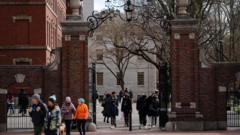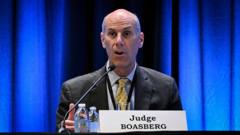The judge's decision allows the Trump administration to initiate deportation proceedings against Khalil, who asserts that his detention stems from exercising his right to free speech. His legal team is preparing to appeal, citing concerns over due process.
Judge Greenlights Deportation of Columbia Graduate Mahmoud Khalil Amid Controversy

Judge Greenlights Deportation of Columbia Graduate Mahmoud Khalil Amid Controversy
A US judge has ruled in favor of deporting Mahmoud Khalil, a Columbia University graduate and pro-Palestinian activist, despite his legal status as a permanent resident.
A US immigration judge has approved the deportation of Mahmoud Khalil, a Columbia University graduate and vocal pro-Palestinian activist, despite his status as a permanent resident. Detained since March, Khalil believes his arrest is a direct repercussion of his advocacy for Palestinian rights. The ruling, influenced by a Cold War-era immigration law, asserts that Khalil's presence in the United States could have adverse impacts on American foreign policy.
Although the ruling does not mandate his immediate removal, his legal team has until April 23 to mount an appeal. Currently held in a detention center in Louisiana, Khalil has emerged as a notable figure in protests against the war in Gaza, participating actively in last year's demonstrations at Columbia University.
The Trump administration justifies the deportation by citing risks to US foreign policy interests, a stance described by the judge as "facially reasonable." Khalil expressed disappointment in the court's proceedings, highlighting a lack of fundamental fairness during the process. The American Civil Liberties Union (ACLU) criticized the decision, emphasizing that the evidence used against Khalil, provided without adequate disclosure, lacked substantiation.
DHS Secretary Kristi Noem endorsed the judge's ruling, stressing that advocacy linked to violence could justify the revocation of residency privileges. However, Khalil's legal team maintains that accusations of antisemitism have not been substantiated, asserting his commitment to lawful expression.
Khalil's attorneys intend to challenge his arrest as unconstitutional in federal court, which may intercept deportation efforts if they prevail. Alongside this, the Trump administration alleges he committed immigration fraud by failing to disclose prior employment with the British embassy and UN agencies, although no new evidence has been presented.
In a statement, the White House reaffirmed its commitment to strict immigration enforcement, aiming to remove individuals whose presence risks national interests. Khalil's case continues to draw scrutiny as he and his legal team prepare for the next stages in what they claim to be a fight for free speech and civil rights.






















